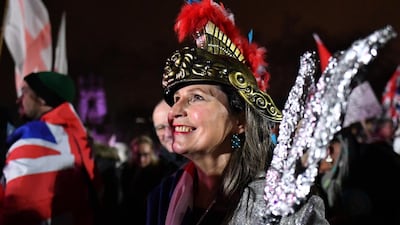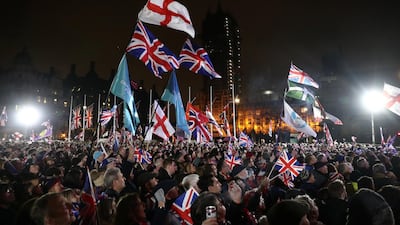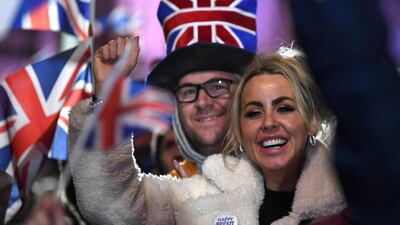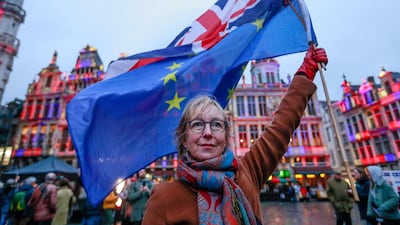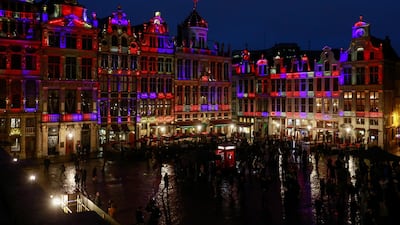Britain marked its formal departure from the European Union on Friday night, in an emotional and historic evening ending nearly five decades of membership with the bloc.
The UK will now begin discussions to secure an EU trade deal in the 11-month window of the transition period, giving it until January 1, 2021 to negotiate an agreement with its largest trading partner.
Britain will also be free to begin trade negotiations with countries around the world. The government aims to have 80 per cent of its trade covered by free trade agreements within three years.
Three and half years on from 2016’s knife edge referendum – where 52 per cent voted leave and 48 per cent voted remain – a mixture of celebration and mourning on Friday showed deep rifts remain across Britain.
British Prime Minister Boris Johnson addressed the nation an hour before Britain left the European Union at 11pm.
Although the speech was largely optimistic, there were muted undertones from the prime minister, who unusually chose to pre-record his address rather than deliver it live outside of Downing Street.
In his address, the prime minister purposely avoided showing triumphalism.
“Tonight we are leaving the European Union. For many people this is an astonishing moment of hope, a moment they thought would never come,” he said.
“There are many of course who feel a sense of anxiety and loss. And then of course there is a third group – perhaps the biggest – who had started to worry that the whole political wrangle would never come to an end.
“I understand all those feelings, and our job as the government – my job – is to bring this country together now and take us forward. And the most important thing to say tonight is that this is not an end but a beginning. This is the moment when the dawn breaks and the curtain goes up on a new act in our great national drama.”
Mr Johnson said he wanted Friday to mark a new era of “friendly co-operation” between Britain and the EU.
“We have obeyed the people. We have taken back the tools of self-government. Now is the time to use those tools to unleash the full potential of this brilliant country and to make better the lives of everyone in every corner of our United Kingdom,” he said.
European leaders gave warnings and expressed caution as the countdown wore on.
French President Emmanuel Macron said Brexit was an “historic warning sign” for the EU in a short televised address.
Irish Prime Minister Leo Varadkar bid farewell to the UK with a message of cautious optimism.
“We do hope it works out for them,” he said.
Earlier on Friday, Mr Johnson held a cabinet meeting in Sunderland, the first British constituency to return a vote to leave the EU back in the early hours of June 24, 2016.
Ministers at the meeting discussed the government’s future trade agenda, which includes the Canada-style free trade agreement it seeks with the EU.
As the clock struck 11pm, a light show projected onto the side of the prime minister’s Downing Street residence marked the moment of Britain’s departure, bidding farewell to each of the bloc’s 27 member states in their own languages.
As part of the day of celebrations, three million coins commemorating Brexit entered circulation on Friday to mark the deadline.
Although there were Union Jacks being waved all over the country, the tense atmosphere revealed a polarised nation. Some saw the country’s break from the bloc as moment of sovereign pride while others saw it as a sad farewell.
Earlier on Friday, pro-Brexit campaign group Leave Means Leave held a rally led Nigel Farage, one of the chief architects of Brexit.
Demonstrators chanted anti-EU slogans and one man was seen lighting an EU flag on fire at the rally in Parliament Square.
When Mr Farage addressed the crowds with minutes to before Britain's departure, he walked on to the stage to the soundtrack of The Final Countdown, ironically by a Swedish band called Europe.
Joseph Afrane, a security worker from London, had been outside the Houses of Parliament celebrating Brexit since the early on Friday. He told The National he was planning to party into the early hours of Saturday.
Mr Afrane was born in Ghana but has lived in Britain for 26 years. He voted to leave in 2016 because he didn’t think it was fair that EU countries have freedom of movement in Britain and Commonwealth nations do not. He sees Brexit as a chance to re-engage with Commonwealth countries, like his native Ghana.
Others were less happy with the Britain's departure from the EU. Raphael Fantetti, an Italian-born lawyer who has lived in the UK for 23 years, told The National: "We didn't like the idea of Brexit in the beginning but of course we accept the decision of the British people because it's a democratic decision."
He said it was crucial that Britain keeps strong relations with Italy and other EU countries after Brexit.
“There are 700,000 Italian people living in London and it’s 'the fifth biggest Italian city' by population. We respect and we welcome the British people in Italy. We know we are welcome here but we just wanted to mark this occasion with a positive message,” he said.
Voters on both sides called for reconciliation. Diane, a receptionist who came up to London from the coastal city of Southampton to celebrate Brexit, said: "It will take time to heal the rifts but everybody’s got to give on both sides. You can’t have a closed mind to it, which a lot of the Remainers still have.”
"People say we are racist, but I am not, I don’t mind immigration at all. What I want is people to come into our country and contribute," she added.
Catriona Graham, an Irish woman who works in women’s rights advocacy and social justice in Brussels, voted remain when she previously lived in the UK.
“It’s hard to comprehend how much of a historic day it is. I wish we had been able to mobilise enough to prevent this happening.
“But in terms of what’s to come really at the European level, we really need to work together to remember the heart of our European values – democracy, fairness and justice – to try and move that forward again and remember that it isn’t just about trade and the economy. It’s about people’s wellbeing and creating better societies."
